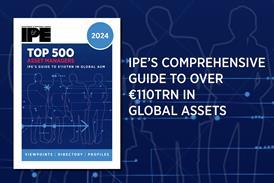More comment – Page 9
-
 Opinion Pieces
Opinion PiecesViewpoint: Progress managing climate risk means stops as well as sprints
A climate stocktake may feel like a delay – in fact, it is crucial to making progress
-
 Opinion Pieces
Opinion PiecesViewpoint: China - Reopening should drive growth
After a year of anaemic growth – by China’s standards – we expect a recovery in Chinese economic activity to gradually take place in 2023
-
 Opinion Pieces
Opinion PiecesViewpoint: Clearing made easier and more resilient, but you can’t make an omelette without breaking eggs
CCP clearing is highly concentrated in a few financial centres around the globe, with the City of London playing a very important role
-
 Opinion Pieces
Opinion PiecesGermany's first-pillar pension reform plans: tough to meet expectations
How would you design your asset allocation if you were building a portfolio from scratch? This is the question facing the governors of Germany’s new state pension buffer fund, the grandly titled ‘Generationenkapital’ (Generational Capital) fund. The expectations are high.
-
 Opinion Pieces
Opinion PiecesFull steam ahead for UK de-risking market
This year is set to be the largest yet for the UK defined benefit (DB) pensions de-risking market, with at least £40bn (€45.8bn) in bulk annuity transactions and £20bn in longevity hedges expected to be completed, according to WTW’s latest de-risking report.
-
 Opinion Pieces
Opinion PiecesAustralia: Super funds face the future of fossil fuels
After a year when fossil fuel stocks outperformed all other shares, Australian super funds face a conundrum – to buy, hold or sell?
-
 Opinion Pieces
Opinion PiecesTime for honesty in the face of the ESG backlash
Sustainable finance is a broad church: it covers small investors whose clients want their capital to benefit society through to big managers who only consider environmental and social issues if they stand to make money.
-
 Opinion Pieces
Opinion PiecesDenmark: Seeking answers on unlisted valuations
The perennial problem of how unlisted assets should be valued has reared its head in Denmark. Data collated by one financial adviser on pension funds’ 2022 private equity investments has led to worries about an apparent black-box approach to valuation processes.
-
 Opinion Pieces
Opinion PiecesUS: Sponsors back pension buyouts
In 2022, pension risk transfer (PRT) deals in the US reached a record of over $50bn (€46.5bn), according to estimates. And many industry observers expect demand from plan sponsors for PRT solutions to remain strong in 2023.
-
 Opinion Pieces
Opinion PiecesGuest viewpoint: The importance of asking the right questions about derivatives and net zero
“What is the carbon footprint of my portfolio?” is thought as the most dangerous question in sustainable investing. But do investors stop and ask: “Why am I measuring the carbon footprint? And how am I planning to manage it?”
-
 Opinion Pieces
Opinion PiecesViewpoint: Climate-related scenario analysis – part of the problem or part of the solution?
‘I’ve yet to see a board of trustees that has made significant changes to its asset allocation as a result of scenario analysis,’ says Julis Pursaill at Cushon
-
 Opinion Pieces
Opinion PiecesViewpoint: And if we trusted the market to improve ESG information?
What trust would one put in financial information that is solely reserved for investors and not published, that no independent analyst could challenge, given that the regulator would have no way of guaranteeing its veracity either?
-
 Opinion Pieces
Opinion PiecesViewpoint: Escape from Flatland
A two-dimensional, return-and-volatility view of investments may not allow you to see important risks
-
 Opinion Pieces
Opinion PiecesPeople power: a hidden strength of public pension funds
Public and sovereign pension funds face a unique set of challenges, sometimes related to resource constraints and often to the glare of open scrutiny.
-
 Opinion Pieces
Opinion PiecesEuropean authorities must focus on derivatives risk
Opinions may differ on whether Brexit has had a positive or negative impact on either of the parties involved. However, it could be argued that an idiosyncratic event such as the liquidity crisis that took place in the United Kingdom at the end of September could have been averted, had the country been part of the bloc. Investors lost confidence in the UK government, now more isolated than before Brexit, and its ability to maintain its fiscal balance, after the announcement of a massive fiscal spending plan at the end of September. That sent yields on UK Gilts soaring and led to a spiralling lack of liquidity, as pension funds rushed to post collateral on their interest-rate derivative positions.
-
 Opinion Pieces
Opinion PiecesGermany’s equity pension plan raises questions
The current legislative period could bring substantial changes to Germany’s pension system. The government is pursuing reforms to fund first-pillar pensions through a buffer fund invested in equities, although there is little consensus on its feasibility.
-
 Opinion Pieces
Opinion PiecesUS: Republican House will not divert from SECURE 2.0
The new Republican majority in the US House of Representatives is not large enough to have a significant impact on the retirement industry.
-
 Opinion Pieces
Opinion PiecesCOP15: Biodiversity develops investment ecosystem
Biodiversity is fast catching up with climate change as a priority for investors and supervisors, and developments last year have set the stage for a productive 2023.
-
 Opinion Pieces
Opinion PiecesGuest viewpoint: Why and how we need to change the conversation about pension reform
In their new book, Power and Prediction, on the disruptive economics of artificial intelligence (AI), authors Ajay Agrawal, Joshua Gans and Avi Goldfarb write about the ‘between times’ between an important new discovery and the time it takes for that discovery to go mainstream. In 1879, Thomas Edison demonstrated the potential of the electric light bulb to change the world, yet 20 years later only 3% of US households had electricity. It would take another 20 years for that number to reach 50% of the population. For electricity the ‘between times’ were 40 years. This prompted the authors to wonder how long the ‘between times’ will be for AI.
-
 Opinion Pieces
Opinion PiecesViewpoint: Beyond Article 9, is there a regulation to promote real sustainability?
Recent events have shown how anticipating forthcoming clarification on the application of a text that has been published since 2019 has created such confusion that many asset managers have had to reclassify a large number of their funds from Article 9 to Article 8.





